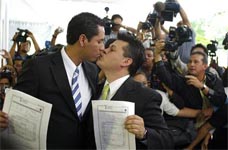The rise and fall of gay marriage in the United States
 San Francisco - If romance is always risky, and even the best-planned wedding is guaranteed to fray a couple's nerves, imagine the roller-coaster emotions that gay California couples must have been feeling this year.
San Francisco - If romance is always risky, and even the best-planned wedding is guaranteed to fray a couple's nerves, imagine the roller-coaster emotions that gay California couples must have been feeling this year.
"It's been the strangest ride," says Mimi Peled, who married her longtime partner, Dana, in an eclectic ceremony this June in a magnificent grove of redwood trees in central California.
The wedding was attended by hundreds of friends and the lesbian couple's 3-year-old son, Boaz, Peled told Deutsche Presse-Agentur dpa.
The happy couple had rushed to the altar in a modern variation of the classic shotgun marriage. Instead of wedding to prevent the birth of a child out of wedlock, this shotgun marriage aimed to take advantage of a unique window of opportunity in California's sexual politics: the few months this year that same-sex couples could legally marry in the state.
The issue of gay marriage has long simmered in the current of California's progressive politics, especially since March 2000 when a voter initiative confining marriage to people of opposite sexes passed by 61.4 per cent to 38 per cent.
But the law was challenged in 2004 when San Francisco Mayor Gavin Newsom ordered city clerks to issue marriage licenses to same-sex couples, arguing that the voter initiative was unconstitutional since it discriminated against gays. The torrent of gay marriage ceremonies in the city didn't last long, however. Less than a month after Newsom's directive, the courts ordered a stop to the weddings.
It took four more years for appeals by gay marriage advocates to result in a definitive ruling on the issue. On May 15 this year, the California Supreme Court overturned the ban on gay marriage finding that "equal respect and dignity" of marriage is a "basic civil right" that cannot be withheld from same-sex couples.
The ruling made California only the second state in the US to sanction gay marriage, and sparked a new flood of gay weddings, boosting the economy with orders for honeymoons, banquets, rings and wedding cakes.
"The wedding was obviously the high point of our lives," said Peled. "We were a family long before that of course, but it was such a powerful moment for us, such a strong validation of our equality under the law, that it made us so proud of who we are, what we had done, and the society we lived in."
But that sense of elation would turn bittersweet on November 5, a day after liberals around the country ironically celebrated the historic election victory of Barack Obama.
California voted for Obama in a landslide, largely thanks to an impressive turnout from the state's large Hispanic and African- American voters.
But those same voters, who are largely socially conservative, were also more receptive to the scare tactics employed by the opponents of gay marriage. Led by the Mormon church, they argued falsely in powerful TV ads that defeating the measure would force church- affiliated adoption agencies to place babies with gay couples, and that gay marriage rites would be taught in state schools.
On the other side, gay marriage activists were in denial that their right to marry could be taken away in the famously liberal state, and they ran an ineffectual and abstract campaign.
The result on election night was that some 6.5 million people voted for the gay marriage ban, compared to about 6 million who voted against it. Gay marriage had once again became illegal in California.
In addition to California, Arizona and Florida also passed gay marriage bans in the November elections. Meanwhile, in Arkansas, voters passed a law depriving gays of the right to adopt children.
Same-sex marriage is legal in only two states - Massachusetts and Connecticut.
But the situation is far from final. In March the California state Supreme Court will hear an appeal that argues that, by discriminating against one group, the ban represents a constitutional revision that requires a two-thirds majority.
The electorate is also likely to change its decision in the not- too-distant future. According to polls, the state's younger voters overwhelmingly approve of gay marriage rites and their electoral influence is bound to rise.
But until either the courts or the voters change the decision, gay couples in California will have to make do with the laws that grant them almost all the same rights as heterosexuals who live together.
For many gay activists, that's a galling situation. But they also understand that the path to equality is never a straight one.
"We have to be patient," says Peled. "It's a long political process that has its ups and downs, but the tide is moving in our favour." (dpa)